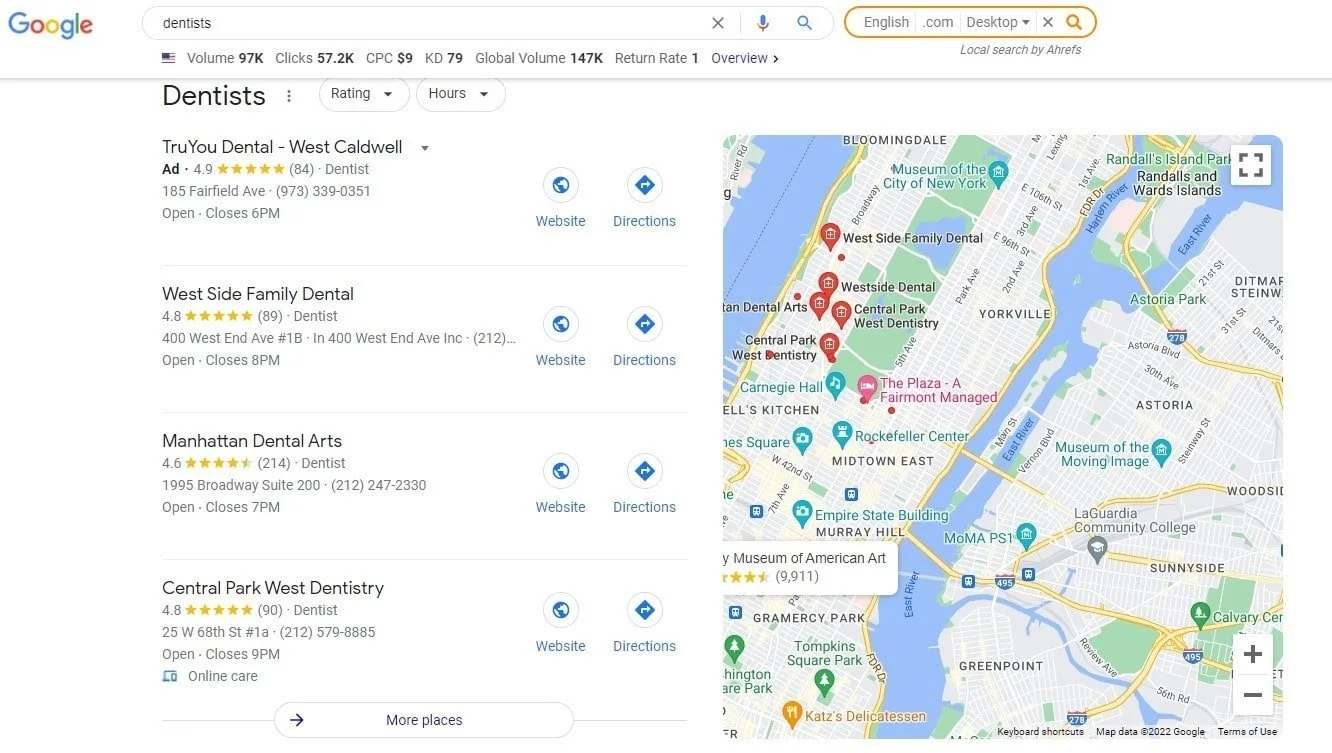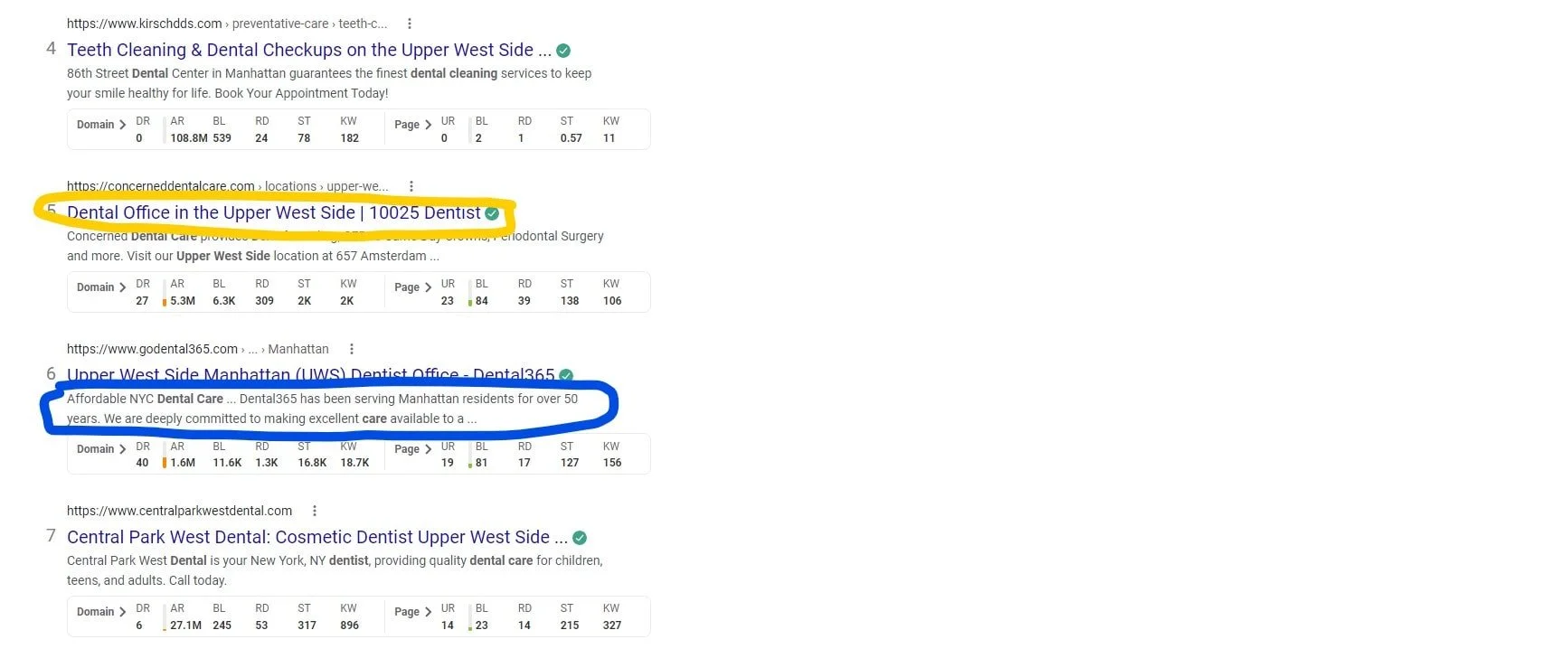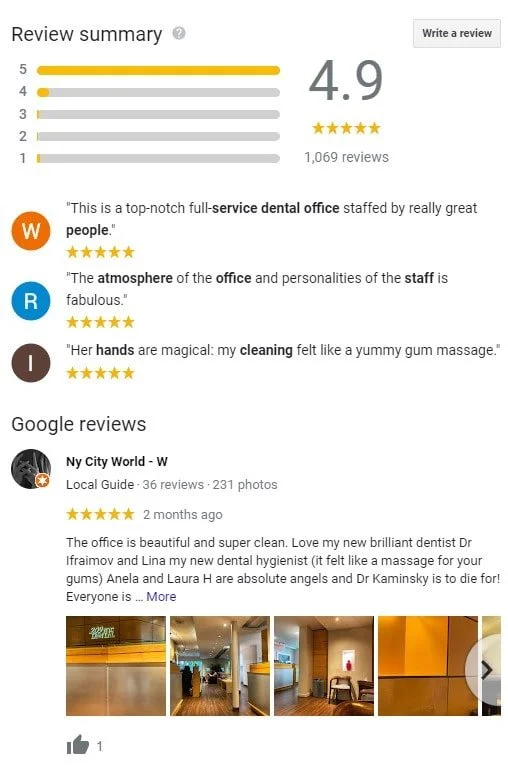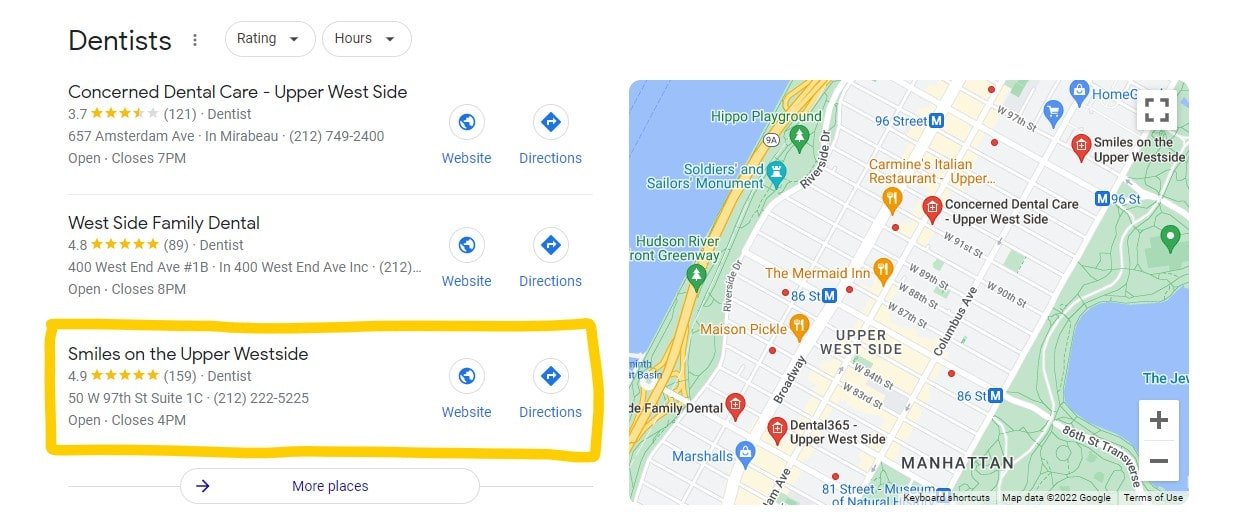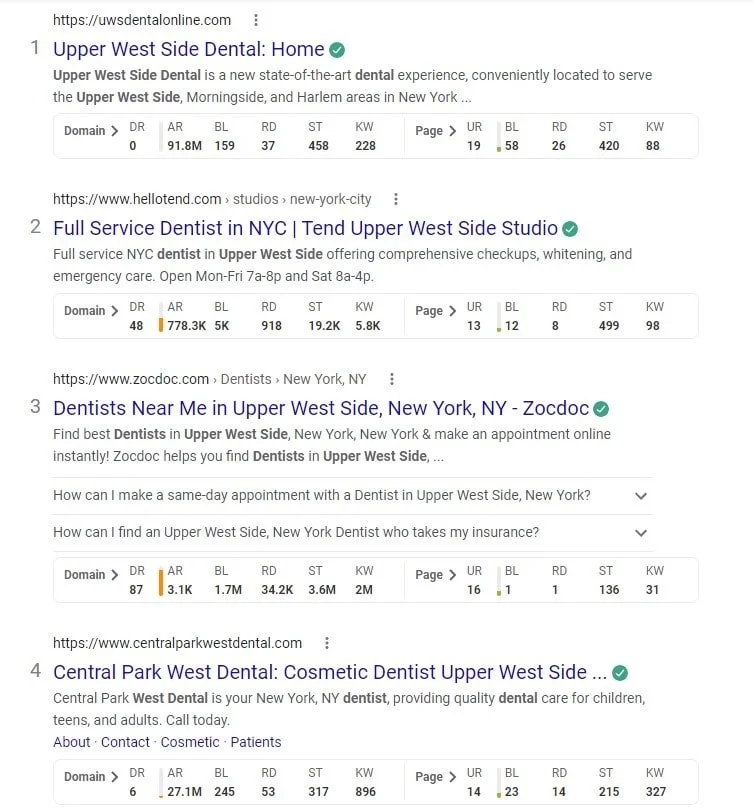SEO for Dentists Guide
As a dentist, you want to ensure that your website is ranking high for relevant keywords. After all, this is how potential patients will find you! However, SEO for dentists can be a complex and time-consuming process – especially if you’re new to it.
That’s why we’ve put together this simple and comprehensive guide to SEO for dentists. In it, we’ll cover everything from on-page optimization to link-building strategies that will help you boost your rankings and get more patients through your door.
What is SEO for dentists?
SEO for dentists is the process of optimizing a dental website for Google search with the goal of earning higher web traffic levels and improving visibility for relevant keywords. The benefits of SEO for dentists are numerous, but can be summarized as follows:
Higher web traffic, leading to more potential patients visiting your site.
Better visibility in Google search results pages leads to increased brand awareness and credibility.
A well-optimized website provides a better user experience, which can lead to higher conversion rates.
In 2022, many dentists rely on healthcare platforms like Zocdoc but that can be an expensive way to acquire new patients. The reality is you don't want to be overdependent on third-party platforms as you have no control over them and are held hostage to their terms and prices.
If you’re looking to improve your dental practice’s online presence, then SEO is an essential piece of the puzzle. It can be confusing, especially for dentists who want to focus on providing great patient care. However, it is important to understand some basics of SEO to attract more patients to your practice.
Key components for SEO for dentists
In order to rank well in search engine results, your dental website must meet certain criteria set by Google.
First and foremost, your website must be mobile-friendly. This means that it should be designed to look good and function properly on all devices, including smartphones and tablets. In addition, your website should be fast and easy to navigate. Google favors websites that load quickly and are free of errors. If you’re not sure whether your website meets these criteria, you can use Google’s Mobile-Friendly Test tool to check.
Most importantly, your website must contain high-quality, authoritative content that is relevant to dental patients in your area. This content should be well-written and keyword-rich to attract the attention of potential patients.
To ensure your content ranks well, we usually go through 3 steps.
Let's go through them in more detail.
Keyword Research
One of the most important aspects of SEO is keyword research. This is the process of finding and analyzing keywords that potential patients are using to search for dental practices like yours.
To find relevant keywords, you can use a variety of tools such as Ubersuggest or Ahrefs Keyword Generator. We use a paid Ahrefs tool but there are plenty of free keyword tools out there. Once you have a list of keywords, you will want to assess their competitiveness. If you are using Ubersuggest, look at the SEO difficulty number to compare between keywords. If you are using Ahrefs Keyword Generator, you can look at keyword difficulty rating (KD). The higher these numbers are, the harder it will be to rank.
Snapshot of Ubersuggest’s keyword report
You should aim to target keywords that are relevant to your dental practice and have a low level of competition. This will give you the best chance of ranking high. Other factors to think about are the search volume, its business potential for your practice, and your ability to create the content.
Here's an example. If you are a dentist located on the Upper West Side in NYC, chances are your patients are living nearby and are looking for dentists in the area. Instead of trying to rank for a very competitive keyword like "dentist nyc" which has over 2000 searches per month, it may be smarter to target less competitive but location-specific keywords like "dentist uws", "uws dentist" and "uws dental". Collectively, these keywords have around 400 searches per month but are high potential keywords with strong business value.
Once you have a list of target keywords, you can start to incorporate them into your content. However, it’s important not to overdo it. Google penalizes websites that stuff their content with too many keywords. Instead, focus on writing high-quality, keyword-rich content that will appeal to potential patients. We'll talk more about the content, or what we call On-Page SEO, in the next section.
On-Page SEO for Dentists
On-page SEO is the process of optimizing your website’s content and structure to ensure it is visible and relevant to search engines. This includes things like adding keywords to your titles and meta tags, as well as making sure your website’s content is relevant and thorough.
One of the most important aspects of on-page SEO is creating keyword-rich titles and meta tag descriptions. These are the elements that appear in the search engine results pages (SERPs), so it’s important to make sure they are attention-grabbing and relevant. So for example, if you have a page targeting a keyword like "dental cleaning upper west side", you might have a title like "Dental Cleaning in Upper West Side NYC" with a description like "The team of specialists at Dental XYZ provide routine dental cleaning at their state-of-the-art dentist office in Upper West Side, NYC. Call today!"
Title is highlighted in yellow, and meta description is highlighted in blue
Your title should be no more than 60 characters, and your meta tags should be around 155 characters. You should also include your target keyword in both the title and meta tags.
Finally and most importantly, you should also focus on creating high-quality, keyword-rich content. Having relevant content is a very important part of doing well with on-page SEO. This means making sure your content is aligned with what people are searching for. Look at the pages that are ranking high today for your keywords. Are they information pages about your dental services or products? Or are they articles and guides that go into detail about a specific dental concern? This gives you an indication of the type of content that will do well.
Example of product / treatment content on teeth straightening
Making sure your content is relevant to what people are searching for is a good start. But it's not usually enough. To be deserving of being one of the top websites on Google, your content needs to deliver on its promise by covering all the things that searchers expect and want to see. The best way to evaluate if your content is good enough is by imagining yourself as a search visitor. Ask yourself if your page has answered all your questions and what you were looking for.
Off-Page SEO for dentists
Off-page SEO is the process of optimizing your website for ranking signals that take place outside of your website. This includes things like link building and online reviews.
One of the most important off-page SEO factors is link building. This is the process of getting other websites to link back to your website. Links are one of the main ways that Google decides which websites should rank higher in the results. The logic is that if other websites are linking to yours, then your website must be relevant and high-quality.
There are a few different ways to build links for dentists. One way is to reach out to other websites in your industry and ask if you can guest post about some dental-related topics. For example, you could write an article about the importance of sports guards for combat athletes on a Brazilian Jiu-Jitsu website.
Another way is to create high-quality content that other websites will want to link to. This could be a flow chart to help patients understand what kind of dental treatments they may need. And finally, you can also participate in link directories and forums.
Lastly, online reviews are also an important off-page SEO factor. This is because they show Google that people are talking about your website and that they are happy with your services. The best way to get online reviews is to simply ask your patients to leave a review on Google.
By focusing on both on-page and off-page SEO, you can make sure that your website is ranking high for relevant keywords.
Local SEO for dentists
You might have also heard of the term Local SEO. So what is that? And do you need that too?
Local SEO is the process of optimizing your website for ranking signals that are specific to your dental practice's location. This includes things like having your correct name, address, and phone number (NAP) on your website as well as making sure you have reviews from local customers. It is not a replacement, but rather a supplement to your standard SEO.
The first thing you need to do is make sure that your business is added on Google Maps through Google's Business Listing. If you’ve ever searched for a local business or service, then you know that the first result that appears is usually a map directory. To optimize your business listing, include as much information about your dental practice as possible, as well as some photos.
Example of a Google Business Listing highlighted in yellow
One of the most important things you can do for local SEO is to make sure your NAP is correct and consistent across all of your online listings. This means that if you have your practice listed on Google Business Listing, Yelp, and Facebook, the name, address, and phone number should be the same on all three listings.
Another important thing you can do for local SEO is to get reviews from patients. These reviews will show up when people do a search for dentists in your city and can help you stand out from the competition. The best way to get reviews is simply to ask your patients to leave one after their appointment.
Lastly, you can also target keywords that are specific to your location. For example, if your dental practice is located in the Upper West Side in NYC, you may want to target keywords that include "uws" or "upper west side".
Examples of dentists targeting the “upper west side” keyword
How much does SEO for dentists cost?
SEO is a 100% free way to advertise your dental practice. You don't have to pay anything. Patients trust organic search results way more than paid advertising.
However you might feel that SEO is too time-consuming or complicated, and you may choose to outsource it. In that scenario, the cost will differ based on the size and breadth of your project. You can also expect to pay more for complex tasks such as link building and or if you have multiple locations.
As a rough gauge, you can expect to pay anywhere from $1,000 to $5000 a month for SEO packages. To get a better idea of how much SEO for dentists will cost, we recommend speaking to an agency. This way, you can get a customized price based on your specific needs and budget.
One important thing to note with SEO agencies is that you get what you pay for. If it is too cheap, you most likely are not getting what you need and are just wasting your money.
Key tips & advice
Before you start, here are some important things to keep in mind.
Keyword strategy is important. Many times, businesses think that SEO doesn't work for them because they started with the wrong keywords. Spend more time on this and make sure you have a mix of keywords that will not only attract patients but also convert them into customers. We usually ideate on keywords across the patient journey, from researching a concern to choosing a dentist.
When you create content, think about what people want to know. You don't have to get too technical or detailed. Most of the time, providing great and useful content is the best thing you can do.
SEO comes with exponential gains over time. You may question if it's worthwhile when you first begin. But as you rank across many keywords and develop a solid online presence and reputation, you'll discover that your flow of patients vastly outpaces those from other methods. You must adopt a long-term approach to success mentality.
Get a free consultation
SEO can be difficult to understand. We want to help you do better with your SEO and make it easier for you. We pride ourselves on being attentive to your needs and getting the results you want.
If you have any questions or just need someone to talk to about your SEO strategy, schedule a free consultation with our SEO experts. We are here to help.

